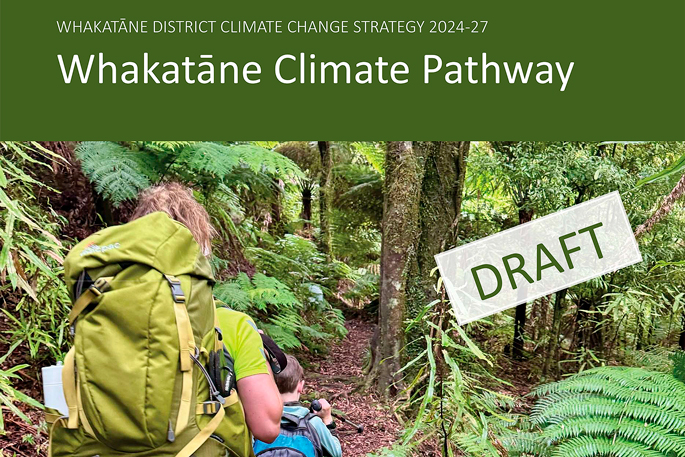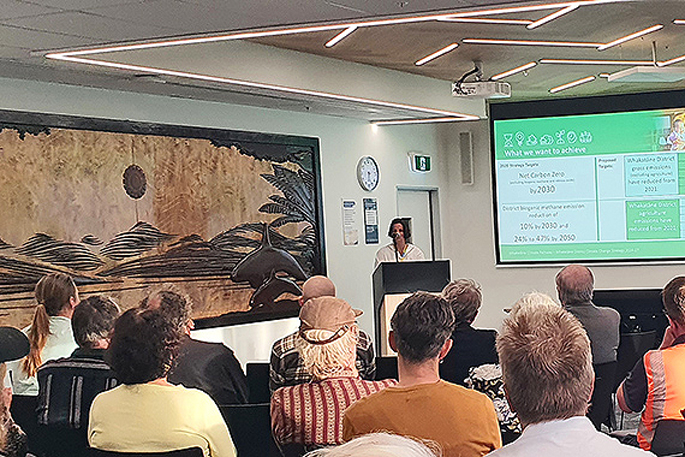The Whakatāne community is being urged to speak up on the council's climate change strategy as the crisis affects people's homes, livelihoods and is already costing lives.
Sustainable Bay of Plenty executive director Glen Crowther praised Whakatāne District Council’s draft Climate Change Strategy at a Green Drinks event last Wednesday, where more than 50 people gathered.
Mr Crowther compared Whakatāne’s approach favourably against other councils.
“It’s incredibly encouraging to see a council that’s been proactive and actually reaching out strongly to connect with communities on this issue.
“Sometimes I think councils find it quite daunting. Some of the Bay of Plenty councils have said, ‘we don’t want to set targets, because we may not reach them, and then what will the public think?’.
“My attitude is, they’ll probably think better of you if you give it a go.”
Whakatāne District Council were partners for the event, held at the council chambers as a way to engage with the community on its Climate Change Strategy 2024-2027.
Mr Crowther said he hoped it would be the first of a regular series of events in which the trust planned to partner with a variety of other organisations.
The strategy sets targets for reducing the council’s gross greenhouse gas emissions by 7 percent by 2027, 12 percent by 2030, 29 percent by 2040 and 39 percent by 2050.
It also sets district-wide targets for supporting the community to make energy changes in homes, schools, marae and workplaces.
Whakatāne Mayor Victor Luca said he was “incredibly concerned about climate change”, which was the responsibility of "each of us, individually and collectively”.
“We know the sooner the world transitions away from a high-carbon society, the less we humans will need to adapt to a changing climate and devastating weather events that will ultimately impact our community.”
Council climate change project manager Cashy Ball said climate change was not a future worry.
“It’s right here and it’s right now,” Ms Ball said. “It’s affecting our back pocket. It’s affecting our homes and our livelihoods and it’s already costing people’s lives.”
She gave Cyclone Gabrielle as an example.
“It’s estimated its going to cost over 2 percent of the national GDP, which potentially is more than we need to be investing to tackle the climate change crisis.”
She said the council’s strategy, first drafted in 2020, was being reviewed due to political changes, advances in technology and changes in society.
“We now really want to hear what the community think about it so it’s really important that you have your say,” Ms Ball said.
The council has identified 226 actions, listed on its website.
 Whakatāne Climate Pathway is a draft strategy currently going through consultation.
Whakatāne Climate Pathway is a draft strategy currently going through consultation.
“Some are things that community groups might pick up and work on together, some are things businesses might work on and others are things that council will drive.”
Not all of those actions are funded in the draft long-term plan now under consultation.
Ms Bell urged people to make their submissions by April 12.
“We really want to know, is that list a good list, is there things missing? We want this to be a community document.”
LDR is local body journalism co-funded by RNZ and NZ On Air.




4 comments
Hmmm
Posted on 03-04-2024 17:27 | By Let's get real
We are being distracted (there are other unprintable words) by the scaremongering, hand-wringing eco-warriors that are in unbelievable numbers throughout our country. Maybe (and it's a very big MAYBE) there is a small relationship between human activities and the gradual changes in the environment.
BUT, anyone who believes that making expensive changes in the Bay of Plenty, will in any way alter the environment has rocks in their head.
A much better USE of the money would be to plan for the results, rather than trying to stop it from happening.
Investment in mitigating storm damage, creating levys (to confine flooding to smaller areas) and spending money now, rather than after the event, on other measures to help affected families, is a far better use of council resources than setting pointless targets for reducing greenhouse gas emissions.
We emit LESS THAN QUARTER OF ONE PERCENT....
Climate has always changed
Posted on 04-04-2024 09:09 | By an_alias
Please look at history, climate has always changed and always will.
Cyclone Gabrielle, please look back in history and you will find way more cyclones that happened at a much greater frequency than today.
This was before industrialization and cars. Also ask why NIWA climate model data only goes back 40 years and does not contain all the newspaper reported cyclones.
@ an_alias
Posted on 04-04-2024 21:06 | By groutby
.........indeed there is a graph and I would suspect other data stating clearly far bigger impacts on the planet in the past than in recent years as naively referenced to by such organisations as NIWA and the others with the agenda of fear.
This information has not been 'peer reviewed', published and never will be as it does not suit the required agenda...
For those totally committed, until the 'big emitters' ie China, Russia, US and others making up the bulk of emissions are reigned in, your efforts are in vein.
Will you all try to make direct impact on these countries or simply continue to virtue signal because it's popular and 'trendy'....your call...
Yes And
Posted on 05-04-2024 16:03 | By fraylock
Everybody seems to think that climate change is someone else's problem to solve. As stated in this article, it is the "responsibility each of us, individually and collectively." Yes, we should strive to lessen our emissions AND invest in mitigation infrastructure. It is not either/or. I am appreciative for all the governments and individuals globally who are making an effort here. I want my kids (and others') to grow up in a livable world. You may call that trendy but I call it common sense.
Leave a Comment
You must be logged in to make a comment.